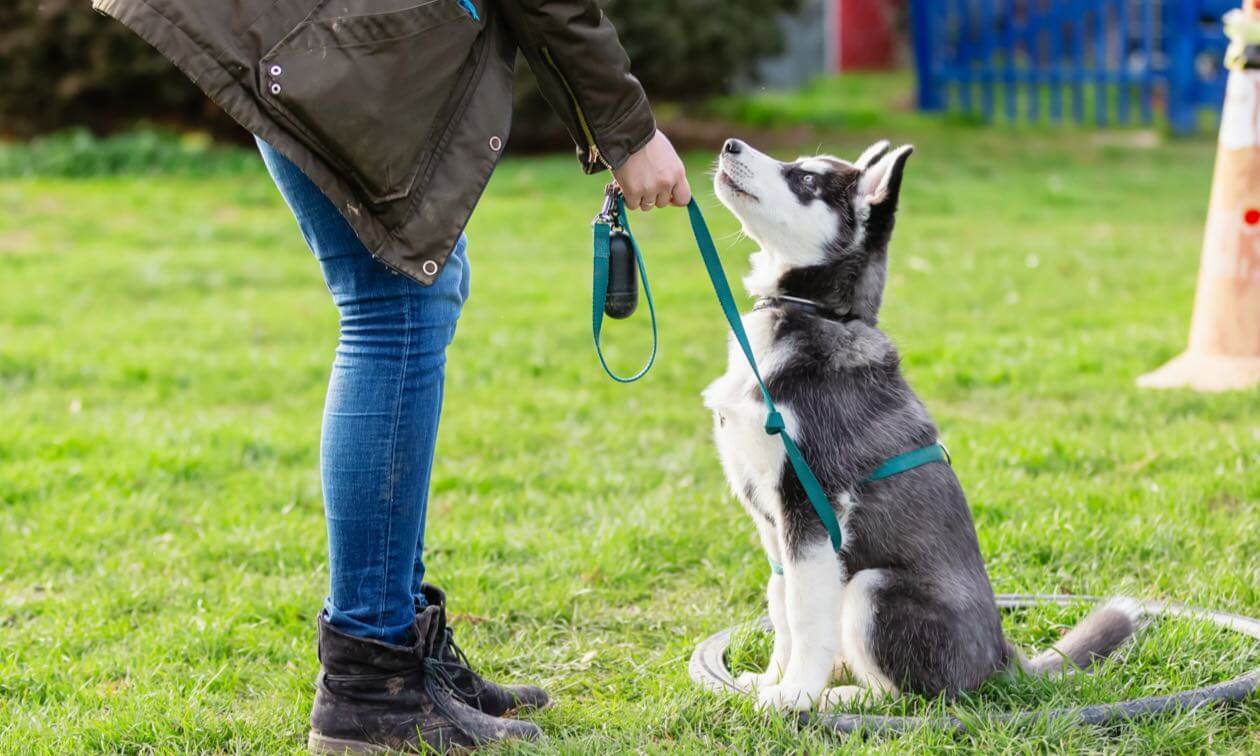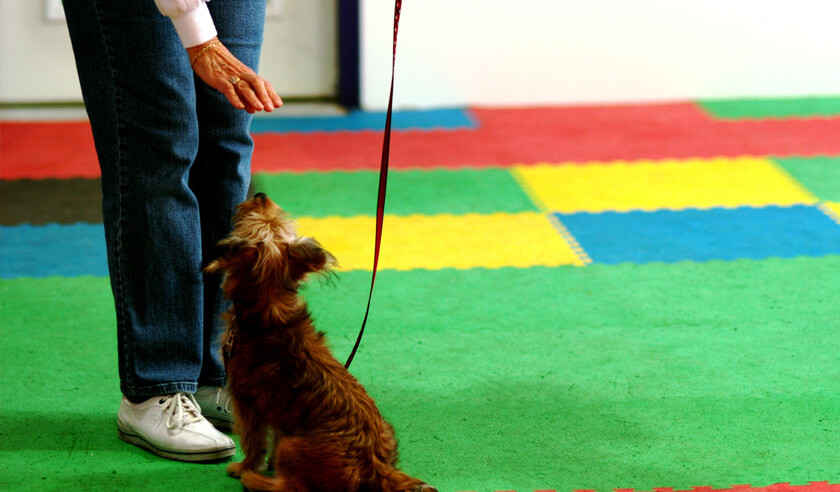Choosing the right dog trainer to help your pet is an important, often nerve-wracking decision. A dog trainer is an integral part of your support team, coaching you on how to communicate with your dog and build a bond of trust. Finding the right match means success and fun in learning, but the wrong match can mean frustration for everyone.
The dog training industry is currently unregulated, meaning anyone can decide to call themselves a professional dog trainer and charge for their services. Knowing how to find a qualified dog trainer who follows best practices in animal training and behavior is essential to ensure the best experience possible.
There are veterinarians who work as board-certified veterinary behaviorists, also known as Diplomate of the American College of Veterinary Behaviorists (DACVB). These are veterinarians that do additional training after veterinary school including a residency, do research and publish papers, and pass a board exam to become board certified in behavior. They are your best source for serious concerns about your dog’s behavior and can also give you recommendations for dog trainers in your area.
How to Find a Dog Trainer
Before choosing a dog trainer, you’ll need to find a few options and then narrow down from there.
Know What You're Looking For
Before you begin your search, define what you and your dog need in terms of training and behavior.
Looking to work on basic training skills, like sit, stay, and come? A group training class is a great option. If you want to work on training issues like jumping on guests or counter surfing, having a trainer come to your home for a private lesson may be your best bet to help you address the behavior in the context it happens most. Want to learn a new dog sport, like nose work, herding, or barn hunt? You'll need a trainer who participates in and teaches those sports.
If you're looking for help with behavioral issues such as fear, aggression, or anxiety, it's best to connect with a board-certified veterinary behaviorist. rather than a dog trainer. Think of this as hiring a therapist instead of a sports coach for your dog. If your dog is struggling with things like resource guarding or separation anxiety, it's worth it to reach out to specialists across the country who offer online consultations if there are no specialists in your area.
Ask for Referrals
Once you've defined what level of support you need, it's time to start looking! There are lots of people in your community who can help you compile a list of trainer and behavior consultant options, such as:
- Your Veterinarian's Office
- Local Shelters and Rescues
- Friends and Family With Dogs
- Your Local, Reputable Breed Club
Remember, just because you get a recommendation from one of these sources doesn't mean that trainer or consultant is right for you and your dog. Referrals from local pet businesses are greatly influenced by how well a trainer has marketed their services — and being a good marketer doesn't always equal a good dog trainer.
Online Search
Hop on the web and search for dog training near you. Compare the results to the word-of-mouth referrals you've compiled. Check out what services are offered. If you're looking for group classes, does the schedule match your availability? Does the trainer specialize in the area you're looking for help in? Do they have recorded events or videos online that show them in action?
Just like local business referrals, online search results are influenced by how well a trainer has positioned their website for search engines to find. A fancy website or being first on the search results list does not guarantee that a trainer is right for your needs. But again, it's a great way to narrow down who you'll interview.
How To Choose A Dog Trainer
Once you have your list, you'll want to research the questions below using their website, email, or a phone call. Connecting with the trainer before hiring them also gives you a chance to get a vibe for their teaching and communication style.
Choose a trainer that follows the most up-to-date behavior science and ethical training philosophy to ensure that your dog is in the best hands. Look for keywords like force-free, positive reinforcement, and fear-free.
Unfortunately, certain training methods are still prevalent because of the lack of industry regulation. The use of force, intimidation, and punishment with aversive tools has been studied and shown to have detrimental effects on a dog's behavior, such as increased aggression1. It has been proven less effective than positive reinforcement training2.
It's best to avoid these outdated methods and tools for your dog's health and behavior. Stay away from trainers who use the word "balanced" to describe their training methods. This means they utilize positive punishment or negative reinforcement (using aversive tools or techniques) in their program. Avoid trainers who use terms such as "calm submission," "pack theory," "alpha," or "dominance theory."
Questions To Ask a Dog Trainer
- What Education and Qualifications Do They Have?
While the industry is unregulated, many trainers are working to create a standard of excellence by obtaining certifications. Ask the trainer what certifications they hold, what these certifications mean, and whether they're a member of any professional dog training associations. Did the trainer complete a reputable dog trainer course that taught them animal behavior and learning sciences? Or did they "learn on the job"? How many years have they been working with dogs, or how long have they specialized in a particular training niche?
A dog trainer's certification matters, as this shows they invested time, money, and energy in proving their competence and skills. Most dog trainer certifications also require signing ethics pledges that do not allow the use of force, intimidation, or punishment methods. However, a certification isn't everything! There are varying types of certifications, such as first-party (obtained automatically upon graduation from a particular program) vs. third-party (competence is established by testing and verification of experience by an unbiased organization). Just because someone signed an ethics pledge doesn't mean they're adhering to it — It's still essential to make sure their ethics and methods match yours.
Organizations such as Certification Council for Professional Dog trainers (CCPDT) and the International Association of Animal Behavior Consultants (IAABC) are groups that are working to standardize and accredit dog trainers. Finding a trainer with one of these accreditations would be helpful. - What Training Methods Do They Use?
A great way to get a glimpse into whether a trainer uses outdated aversive training methods is to ask them, "What happens to my dog when they get something wrong or ignore what you asked them to do?" - What Training Tools Do They Use?
Ask the trainer what kind of gear they use in training. Avoid prong, choke, or shock collars. A trainer using positive reinforcement will use treats, toys and clicker training. You should never use a trainer that your dog appears afraid of. - What Types of Cases Do They Refer Out?
This question is a great way to identify a confident and educated trainer. There are various dog training and behavior issues, and it's difficult for a trainer to be qualified in all of them. A trainer must know their limits and want to make sure you find the right match for your dog's needs. - Do They Offer a Guarantee?
The correct answer to this is counterintuitive — a dog trainer should not offer any guarantee to fix the behavior. Dogs are not robots and promising to fix a dog's problems ignores the number of variables that affect behavior. The only guarantee a reputable dog trainer should make is that they will support you and your dog throughout the training process and set you up for success.
ZPC-02547
- Herron et al. Survey of the use and outcome of confrontational and non-confrontational training methods in client-owned dogs showing undesired behaviors. Applied Animal Behaviour Science, 2009; 117 (1-2): 47 DOI: 10.1016/j.applanim.2008.12.011
- Efficacy of Dog Training With and Without Remote Electronic Collars vs. a Focus on Positive Reinforcement. Frontiers. https://www.frontiersin.org/articles/10.3389/fvets.2020.00508/full?fbclid=IwAR2KnncUI7QbcJhGmUqzZJ5f4OAG3Vtkmn7Q0mTn3LdIsohcz_BWV1dbkr4. Accessed November 22, 2022





